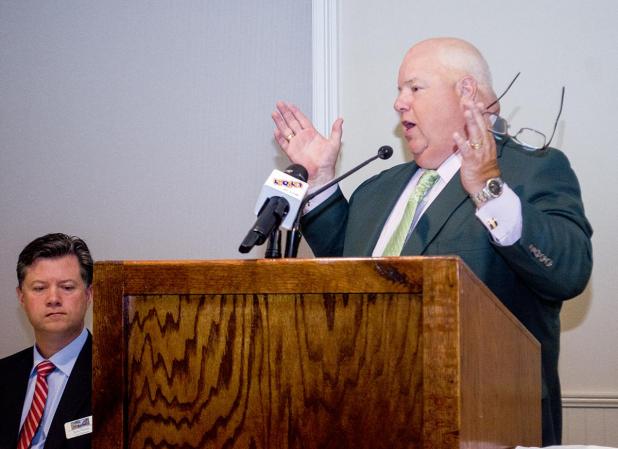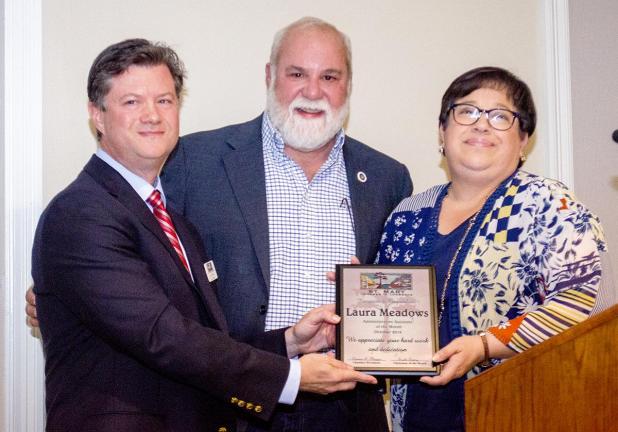
Mike Strain

St. Mary Chamber of Commerce awarded Laura Meadows as Administrative Assistant of the Month for October 2019. Meadows is the assistant of State Senator Bret Allain.
The Banner-Tribune/Casey Collier
Strain speaks to Chamber members on agriculture
Louisiana Agriculture Commissioner Dr. Mike Strain gave his annual address at the St. Mary Parish Chamber of Commerce luncheon Wednesday at The Forest Restaurant in Franklin.
He began with, “Here in St. Mary Parish, when you look at the value of agriculture, it’s over $80 million-a-year directed directly to the farms.
“Look at the value of sugar; it’s over $60 million-a-year. Sugar this year has earned $1.1 billion dollars here in Louisiana.
“The value of Louisiana agriculture is at $13 billion dollars (per year). Ten years ago it was at $5.7 (billion dollars-a-year). And it’s going to continue to grow.”
Strain went on to compare Louisiana’s success with sugar, against the global food supply, through the lens of the role the world must play in doubling its own food supply by 2050.
He called back to an address he gave “four or five years back,” in which he noted that by 2050 the world would see its food supply necessarily doubled, and that in order to do that, the collective economies of the world would need to increase our agricultural output by 2.7 to 2.8% per year, “when in our best year we get 2.5 (percent growth per year).”
In terms of progress toward that necessary global goal, Strain pointed to consumption versus accumulative production.
“The last two years, the world has consumed more rice than it has produced,” he said. “Last year it consumed more wheat and more rice than it produced.”
He added perspective to the problem by stating that China has just opened their strategic reserves of pork and cotton.
He reproached the media for not covering such an important story, and said that if one were want to keep track of such data, there is only to look to World Agriculture Supply and Demand reports, which he said, is also a good indicator of what global financial markets are going to do.
According to Strain, the world’s leading food supply necessities are rice, wheat and proteins (pork, beef, shrimp, etc.).
He said that there are two culprits for the world falling behind in reaching its necessary food supply increase goals: population outpacing supply, or failed increase in production.
As the world’s leading producer of exported food supplies, the US finds itself in a compulsory role in global food production, according to Strain.
This led Strain to speak of recent continental and intercontinental trade deals and negotiations around the world.
“All we are asking for is a level playing field,” Strain told attendees.
He said he had lead the trade delegations between the US, Canada and Mexico two weeks ago, working on the United States-Mexico-Canada Agreement.
The agreement is based on ensuring fair and equitable trade conditions between its namesake’s countries, doing away with disproportionate irritants.
Strain called the protection of intellectual property “the big key” in negotiations with Mexico; and outside of the USCMA, in negotiations with China.
“Right now, sitting in Washington, ready to be signed is the USMCA agreement. That needs to come off the floor, out of the House (of Representatives) and be voted on,” Strain said.
“Mexico has signed it, and we have put additional restrictions on Mexico. They signed it. Ours is sitting.
“Once that is signed, it will add another $70 billion and 173,000 jobs to America’s economy.
“It is critical. We cannot let it sit there. We need to sign it.”
According to Strain, this week, America signed a unilateral trade deal with Japan which will increase our trade of agricultural products with Japan by 50%.
He also stated that in his estimation, China has finally come to the negotiating table with the US based on the trade deals the US is making with Japan and Britain; and because of the effects of tariffs placed on China by the Trump administration.
“As we sign these deals,” Strain said, “we trade with countries we have these deals with. So, that told China, ‘You either come to the negotiating table, or you are not going to be at the dinner table.’”
Strain pivoted at this point, from global agriculture, to local agriculture.
“What’s really important is that we must invest in infrastructure,” he said.
Through “infrastructure,” Strain identified port infrastructure across the state.
“That helps us to move product,” he said. “By moving product more efficiently, we put money where? (We put it) back in the hands of the farmers. And what do farmers do when they get money? They put it back into the farms, right?
“It grows the economy.
“Agriculture is the largest industry in Louisiana and the largest industry in our parish. So, we are in a positive place where there are a lot of positive things going on. But, we must control our destiny moving forward.”
Strain closed with, “We must drive the train.”
